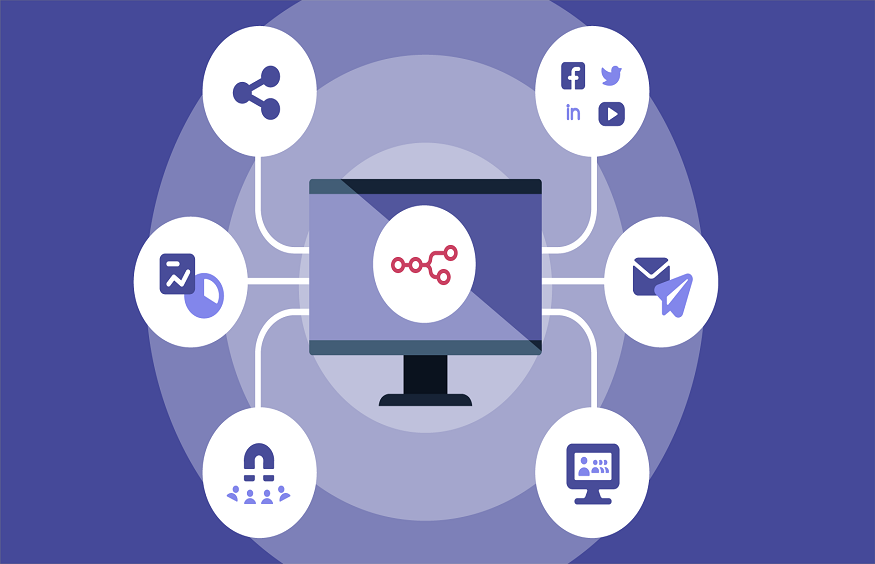Marketing in today’s business climate increasingly is leaning towards automation and data management as a way of improving competitiveness. Thus, using these technologies, it is possible to make the right decision, manage campaigns, and enhance a company’s contacts with the target audience. Brands are also able to build better engagement and increased personalization and cohesion for branding across multiple points of contact. To better understand how these tools and strategies operate collectively to produce practical marketing approaches, let’s begin by looking.
Improving the Efficiency of campaigns Using Automation
It also reduces the load of routine work, and thus allows marketers to focus on generating campaigns, and on strategizing. It eliminates repetitive tasks on sending emails, posting on social media platforms, lead nurturing, and managing, and makes it possible to deliver messages at the right time to the right segments of the population.
Incorporating marketing automation tools into your strategy allows for the automatic tracking and analysis of customer behavior. For example, automated workflows can adjust based on customer engagement—sending follow-up emails to users who didn’t open a previous message, or targeting those who engaged with certain products. This level of automation ensures that communication remains relevant and timely, which can significantly improve conversion rates and customer satisfaction.
Leveraging Data to Refine Targeting
Marketing information is important in the success of any marketing communication strategy and thus proper management of the data is vital. Understanding customer data allows businesses to learn much more about the customer, as well as their purchasing habits and general activity. From this data, one will be in a position to segment the audience and in the process develop campaigns in a manner that will appeal to these segmented groups making campaigns more efficient and with high return on investment (ROI).
Marketing automation solutions synchronize with data management solutions to analyze user interactions on their own and to offer recommendations that brands and businesses can use to improve their targeting strategies. Armed with the knowledge of customer personas derived from the data collected, a business can message its employees in a way that will likely gain the attention of the target customer and bring about the necessary action. In today’s world of big data and high customer demand, market niches need to be targeted and the message needs to be delivered to the right people at the right time.
Creating Unique Information Related to Customers
Customization has been critical in messaging, and marketing automation solutions help implement it on a large scale. Brands can also automate customer follow-up and subsequent emails, products, and offers that match the customer’s profile.
For example, an online store may collect data regarding customers who often visit a certain category of products, and electronically send them messages with related products. It assures a higher chance of conversion and establishes a more powerful relation between the customer and the product. This can be accomplished by marketing automation tools where businesses can personally engage with each customer at a large scale but without consuming much of the company’s internal capacity.
Nurturing Leads and Building Customer Loyalty
Customer relations and management are also enhanced through automation, mainly through lead nurturing. Marketing automation can be employed to take the prospective customer through a buying cycle from the time they make their first contact until they make the final purchase. When they chop up the leads based on their activities, then they can set up a series of messages that help to persuade potential customers to buy the product.
Even after a sale is made, automation tools can still be used in a pursuit to build loyalty with the customer. Many of the follow-up emails sent post-purchase, birthday discounts, and inviting customers to the loyalty program can be easily set as an automatic email. Such timely, and most importantly, related messages contribute to customer engagement and transition from a single-buyer status and their establishment as loyal clients.
Measuring Success with Real-Time Data
Last but not least, automation and data management create the possibility to monitor a campaign’s performance in real-time which is crucial for modern and efficient marketing. This allows businesses to understand what works and what does not by simply analyzing open rates, CTR, and conversion rates. It allows the companies to be proactive instead of reactive – to make changes to campaigns to get the most out of them.
Data analysis also revealed can also be used to improve the next campaigns since it will act as a form of feedback. It is possible to combine marketing automation with data analysis tools as part of which companies can increase the effectiveness of each subsequent campaign based on previous successes achieved by the marketing team.
Conclusion
Introducing and utilizing marketing automation tools and data management is an effective way for businesses aspiring to develop effective marketing communications, cut through the clutter, and achieve their goals while catering to customer wants and needs. Through the use of automation of action and analysis, enhanced targeting using data, and now and then evaluation of effectiveness, organizations can provide excellent customized services that can enhance brand associations and in the process create value.
Successful companies are no longer an exception to using automation and data-driven approaches in the current tight market. It is indispensable for companies to maintain competitive advantages and adapt to customers’ increasing demands. This is a common marketing style with which brands can effectively and efficiently market their products while embracing the growing information needs of the consumers.



